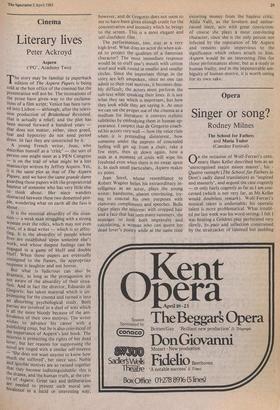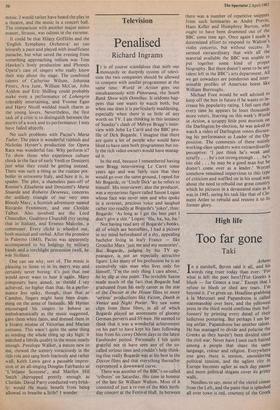Opera
Singer or song?
Rodney Milnes
The School for Fathers and Maria Tudor (Camden Festival)
nn the occasion of Wolf-Ferrari's cent-
enary Hans Keller described him as an 'unrecognised major minor master', his - Quatro rusteghi (The School for Fathers in Dent's sadly dated translation) as 'inspired and masterly', and argued the case cogently — or only fairly cogently as far as I am con- cerned (which is not very far, as Mr Keller would doubtless remark). Wolf-Ferrari's musical talent is undeniable; his operatic talent is more problematical. What troubl- ed me last week was his word-setting: I felt I was hearing a Goldoni play performed very slowly, its pace and inflection constrained by the straitjacket of talented but ambling
music. I would rather have heard the play in a theatre, and the music in a concert hall. The comparison with another major minor master, Strauss, was odious in the extreme.
It could be that Hilary Griffiths and the 'English Symphony Orchestra' set too leisurely a pace and played with insufficient panache, but what saved the evening from something approaching tedium was Tom Hawkes's lively production and Phoenix Opera's cast of singers who really know their way about the stage. The combined talents of Catherine Wilson, Johanna Peters, Ava June, William McCue, John Ayldon and Eric Shilling could probably make even a performance of Lohengrin tolerably entertaining, and Yvonne Egan and Harry Nicoll wielded much charm as the young lovers. Nevertheless, the first task of a critic is to distinguish between the merits of a work and its performance: I may have failed abjectly.
No such problems with Pacini's Maria Tudor. The piece is wonderful rubbish and Nicholas Hytner's production for Opera Rara was wonderful fun. Why perform it? To show those who experience culture shock in the face of early Verdi or Donizetti just what they could be getting instead. There was such a thing as the routine pot- boiler in ottocento Italy, and here it is, in spades. The plot, a shameless pass-off of Rossini's Elisabetta and Donizetti's Maria Stuarda and Roberto Devereux, concerns the unlikely triangle of our very own Bloody Mary, a Scottish adventurer named Riccardo Fennimore, and one Clotilde Talbot. Also involved are the Lord Chancellor, Gualtiero Churchill (try saying that in Italian), and Ernesto Malcolm, a commoner. Every cliche is wheeled out, both musical and verbal. After the premiere in Palermo (1843), Pacini was apparently accompanied to his lodgings by military bands and a torchlight procession (well, he was Sicilian).
One can see why, sort of. The music is pleasing to listen to in its merry way and certainly never boring: it's just that one would never want to hear it again. Many composers have aimed, or should I say achieved, no higher than that. In a perfor- mance less spiky, though, than that at Camden, fingers might have been drum- ming on the arms of fauteuils. Mr Hytner encouraged his singers to behave as melodramatically as the music suggested, gave them white faces, and dressed them in a bizarre mixtue of Victorian and Marian costume. This wasn't quite the same thing as sending the whole thing up sky high: it matched a febrile quality in the music neatly enough. Penelope Walker, a mezzo new to me, chewed the scenery voraciously in the title role and sang both fearlessly and rather well. Keith Lewis gave a passable impres- sion of an all-singing Douglas Fairbanks as L'infame Scozzese', and Marilyn Hill Smith chirrupped prettily enough as Clotilde. David Parry conducted very brisk- ly: would the music benefit from being allowed to breathe a little? 1 wonder.







































 Previous page
Previous page